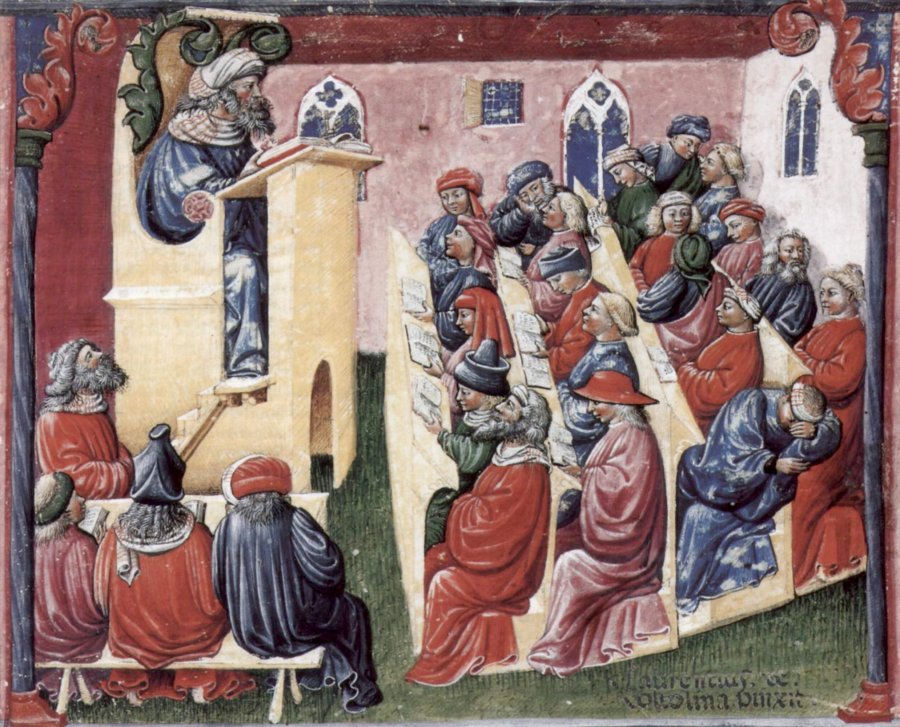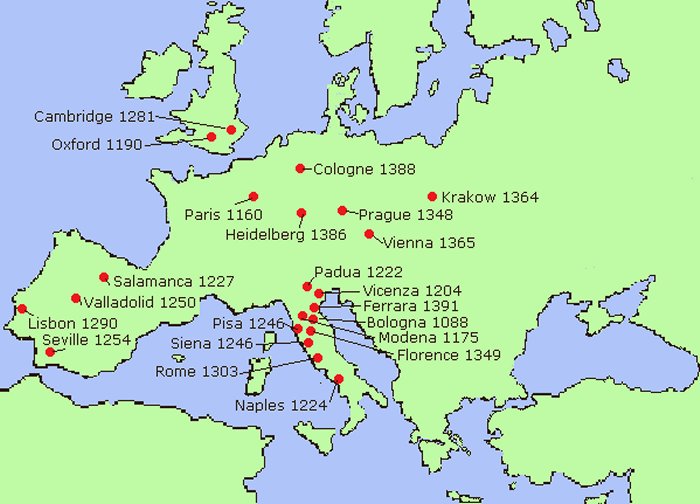What Was It Like To Be A Student In The Middle Ages?
Conny Waters - AncientPages.com - Historians estimate that a few thousand Europeans were studying at one of the Middle Ages universities, every year.
Respected and eminent teachers were very popular and their charisma strongly influenced the number of students.
Famous professors could attract students from all over Europe.
University of Bologna, c. 1350
Until the late 12th century, a university was not a physical place but rather a concept of an association of students and teachers. The Latin word for ‘university’ is a ‘union’.
The teaching took place in monasteries, private home or another place, suitable enough for a group of students.
Only a small fraction of the students who enrolled in universities in the Middle Ages completed
their studies and were awarded degrees.
Also, we shouldn't forget as previously mentioned on Ancient Pages, there is evidence that teaching in Oxford began as far back as 1096, making it the oldest university in the English-speaking world. It is also one of the world's oldest university in continuous operation. Actually, Oxford University is older than the Aztec Empire.
Universities in the Middle Ages.
A university education was never cheap in the Middle Ages. Fees for attending universities were not clearly defined. There were no course catalogs, no lab fees.
See also:
Nalanda – Oldest University In The World – Masterpiece Of Ancient World
Minutes Did Not Exist During The Middle Ages
Students had to pay the cost of travel to the university, room, drink and food. They paid fees for lectures, parchment, ink and the rental or purchase of texts. Additionally, there were also fees for joining a 'nation' or another student group.
However, failing to complete a degree did not mean that the time spent at the university was the waste
of time. On the contrary, even without obtaining a formal degree, was very useful and provided many students with an education and credentials sufficient enough for successful careers.
Written by Conny Waters – AncientPages.com Staff Writer
Copyright © AncientPages.com All rights reserved. This material may not be published, broadcast, rewritten or redistributed in whole or part without the express written permission of AncientPages.com
Expand for referencesP. B. Newman, 'Growing Up in the Middle Ages'
More From Ancient Pages
-
 Monte d’Accoddi – Mesopotamian Ziggurat In Europe Built By King Of Uruk?
Featured Stories | Feb 5, 2018
Monte d’Accoddi – Mesopotamian Ziggurat In Europe Built By King Of Uruk?
Featured Stories | Feb 5, 2018 -
 Controversial Ancient Tomb Could Prove The Existence Of Biblical Jonah
Archaeology | Mar 9, 2014
Controversial Ancient Tomb Could Prove The Existence Of Biblical Jonah
Archaeology | Mar 9, 2014 -
 Scylla And Charybdis – Legendary Greek Sea Monsters – Choosing The Lesser Of Two Evils
Featured Stories | Jan 15, 2021
Scylla And Charybdis – Legendary Greek Sea Monsters – Choosing The Lesser Of Two Evils
Featured Stories | Jan 15, 2021 -
 Young Girl Finds Rare Ancient Megalodon Shark Tooth On Maryland Beach
Archaeology | Jan 16, 2023
Young Girl Finds Rare Ancient Megalodon Shark Tooth On Maryland Beach
Archaeology | Jan 16, 2023 -
 Knights Templar – Among The Most Wealthy And Powerful Of The Western Christian Military Orders
Featured Stories | Jun 11, 2020
Knights Templar – Among The Most Wealthy And Powerful Of The Western Christian Military Orders
Featured Stories | Jun 11, 2020 -
 Siege Of Alesia: Last Decisive Battle That Ended Gallic Independence In France And Belgium
Featured Stories | Feb 1, 2017
Siege Of Alesia: Last Decisive Battle That Ended Gallic Independence In France And Belgium
Featured Stories | Feb 1, 2017 -
 Australia’s Two-Meter-Long And Oldest Known Rock Painting Of A Kangaroo – Revealed
News | Feb 23, 2021
Australia’s Two-Meter-Long And Oldest Known Rock Painting Of A Kangaroo – Revealed
News | Feb 23, 2021 -
 Ancient Marble Statue Of Sphinx Discovered In Tang Dynasty Tomb
Archaeology | Dec 16, 2015
Ancient Marble Statue Of Sphinx Discovered In Tang Dynasty Tomb
Archaeology | Dec 16, 2015 -
 Ancient Stone Monoliths In Ethiopia Are 1,000 Years Older Than Previously Thought
Archaeology | Dec 11, 2021
Ancient Stone Monoliths In Ethiopia Are 1,000 Years Older Than Previously Thought
Archaeology | Dec 11, 2021 -
 Young Boy Discovers Rare Ancient Roman Treasure In Sussex, UK
Archaeology | Apr 15, 2024
Young Boy Discovers Rare Ancient Roman Treasure In Sussex, UK
Archaeology | Apr 15, 2024 -
 Ancient Mysteries Of West Virginia: Did Ancient Celts Visit North America Where They Left An Ogham Inscribed Bone Needle With Christian Symbols?
Artifacts | Mar 1, 2017
Ancient Mysteries Of West Virginia: Did Ancient Celts Visit North America Where They Left An Ogham Inscribed Bone Needle With Christian Symbols?
Artifacts | Mar 1, 2017 -
 Troublemaker Eris: Greek Deity That Ignited Hatred Among All
Featured Stories | Apr 11, 2024
Troublemaker Eris: Greek Deity That Ignited Hatred Among All
Featured Stories | Apr 11, 2024 -
 Ancient Egyptians Invented Toothpaste
Ancient Technology | Dec 26, 2015
Ancient Egyptians Invented Toothpaste
Ancient Technology | Dec 26, 2015 -
 3,000-Year-Old Tutankhamun’s Head Sculpture Is Expected To Be Sold On Thursday In London
Archaeology | Jul 2, 2019
3,000-Year-Old Tutankhamun’s Head Sculpture Is Expected To Be Sold On Thursday In London
Archaeology | Jul 2, 2019 -
 Stone Box With Ancient Shell Llama Offering Found In Lake Titicaca
Archaeology | Aug 4, 2020
Stone Box With Ancient Shell Llama Offering Found In Lake Titicaca
Archaeology | Aug 4, 2020 -
 Enigmatic Bronze Age Fulacht Fiadh: ‘Kitchens’ Of The Legendary Irish Warriors
Civilizations | Nov 26, 2018
Enigmatic Bronze Age Fulacht Fiadh: ‘Kitchens’ Of The Legendary Irish Warriors
Civilizations | Nov 26, 2018 -
 Controversial “Life Of St. Issa” Scroll Reveals Jesus Spent Several Years In India And Tibet
Artifacts | Nov 4, 2014
Controversial “Life Of St. Issa” Scroll Reveals Jesus Spent Several Years In India And Tibet
Artifacts | Nov 4, 2014 -
 Mysterious Ancient Site Of Çatalhöyük: Remains Of Early Structures May Shed More Light On Its Obscure Past
Archaeology | Apr 11, 2017
Mysterious Ancient Site Of Çatalhöyük: Remains Of Early Structures May Shed More Light On Its Obscure Past
Archaeology | Apr 11, 2017 -
 Forbidden High-Tech Knowledge Of A Controversial Ancient Lost Super Race
Civilizations | Jun 22, 2018
Forbidden High-Tech Knowledge Of A Controversial Ancient Lost Super Race
Civilizations | Jun 22, 2018 -
 Earliest Baltic Amber In Western Europe Found On The Iberian Peninsula 5,000 Years Ago
Archaeology | Oct 21, 2023
Earliest Baltic Amber In Western Europe Found On The Iberian Peninsula 5,000 Years Ago
Archaeology | Oct 21, 2023


